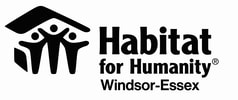FAQ
historical background
Habitat for Humanity International was founded in 1976 in Americus, Georgia by Linda and Millard Fuller. The program developed from the concept of "partnership housing", where those in need of adequate shelter work side by side with volunteers from all walks of life to build simple, decent houses.
In 1984 Habitat's most famous volunteer, former U.S. President Jimmy Carter, along with his wife, Rosalyn, participated in their first Habitat build project. Their personal involvement in Habitat's ministry brought the organization national visibility and sparked interest in Habitat's work across the nation.
Habitat for Humanity Canada (HFHC) was born in 1985, with the formation of the first Canadian affiliate in Winkler Manitoba. In early 1988 an HFHC national office was established, which is currently located in Toronto, Ontario.
Habitat for Humanity Windsor-Essex (HFHWE) was incorporated in 1994.
In 1984 Habitat's most famous volunteer, former U.S. President Jimmy Carter, along with his wife, Rosalyn, participated in their first Habitat build project. Their personal involvement in Habitat's ministry brought the organization national visibility and sparked interest in Habitat's work across the nation.
Habitat for Humanity Canada (HFHC) was born in 1985, with the formation of the first Canadian affiliate in Winkler Manitoba. In early 1988 an HFHC national office was established, which is currently located in Toronto, Ontario.
Habitat for Humanity Windsor-Essex (HFHWE) was incorporated in 1994.
how does Habitat for Humanity work?
Habitat builds safe, decent houses with the help of the homeowner (partner) families. Habitat houses are sold to partner families at fair market value with no down-payment, and are financed with geared-to-income mortgages.
Every mortgage payment received by Habitat goes directly in a trust to build more Habitat homes.
Every mortgage payment received by Habitat goes directly in a trust to build more Habitat homes.
how can I become a volunteer?
Check out our "get involved" tab!
what can I do to help?
- Make a tax deductible donation to Habitat for Humanity Windsor-Essex
- Participate in Habitat fundraising events
- Volunteer at our ReStore
- Involve your company or your faith community
- Make a planned gift to HFHWE
- Join one of our committees
the concept
who qualifies for a home?
The three criteria to qualify for a Habitat home are (1) need for affordable housing, (2) ability to repay a Habitat mortgage and (3) willingness to partner with Habitat.
Need for affordable housing is defined by a family income that is below the government-set Low Income Cut-Off (poverty line) for their particular region, and existing living conditions that are inadequate in terms of structure, cost, safety or size. The ratio of shelter expense to total income is also factored.
Ability to repay a Habitat mortgage requires that the family has a stable income sufficient to cover the monthly mortgage payments and other expenses that come with home ownership.
Applicants must demonstrate a willingness to partner with Habitat by agreeing to contribute 500 hours of volunteer labor.
Need for affordable housing is defined by a family income that is below the government-set Low Income Cut-Off (poverty line) for their particular region, and existing living conditions that are inadequate in terms of structure, cost, safety or size. The ratio of shelter expense to total income is also factored.
Ability to repay a Habitat mortgage requires that the family has a stable income sufficient to cover the monthly mortgage payments and other expenses that come with home ownership.
Applicants must demonstrate a willingness to partner with Habitat by agreeing to contribute 500 hours of volunteer labor.
how are families chosen?
Families are chosen on the basis of the above criteria. Family selection occurs by way of an application process. Please visit the "home ownership" tab for more information.
what does a Habitat house cost?
Once built, each HFHWE home is independently appraised, and the homes are sold at fair market value.
how does this program benefit the families and communities in the long-run?
A safe, healthy living environment contributes to the positive growth and development of children. The children of families that
partner with Habitat achieve greater educational outcomes, and parents’ employment prospects improve. With stable housing, Habitat homeowners become long-term contributors to the community and the local economy.
Communities benefit as former renters become homeowners who contribute to the tax base. Habitat build projects can also offer an opportunity for community members to come together and work side by side in a meaningful way.
partner with Habitat achieve greater educational outcomes, and parents’ employment prospects improve. With stable housing, Habitat homeowners become long-term contributors to the community and the local economy.
Communities benefit as former renters become homeowners who contribute to the tax base. Habitat build projects can also offer an opportunity for community members to come together and work side by side in a meaningful way.



